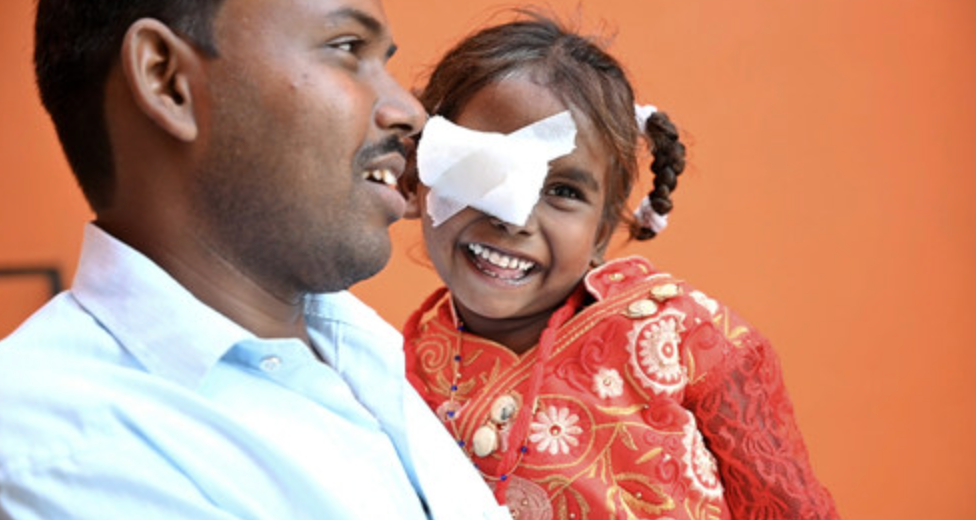New findings identify top 3 barriers to pediatric cataract treatment in India
Research also highlights the top factors that lead to care, which can be used to improve parents' uptake of sight-saving surgery for their children.
The eye care nonprofit Orbis International announces its collaboration on new research published in the latest issue of the top-tier peer-reviewed medical journal PLOS ONE.
The research outlines the findings of in-depth interviews conducted with parents and caregivers across India that were used to determine the top barriers to accessing sight-saving cataract treatment for their children.
The research also identifies the top enablers – that is, the factors that motivate families – for seeking care.
San traveled over 90 miles by bus so that his daughter. Photo credit: Geoff Oliver Bugbee/Orbis

San traveled over 90 miles by bus so that his daughter, Vaishnavi, could receive cataract surgery at an Orbis partner hospital in India.
"I wanted to get her treatment as soon as possible because she’s so young, and I know that when she grows older it might get difficult," said San. "I want her to grow up and study."
Ensuring children receive cataract surgery in a timely manner – ideally, no more than three months following a diagnosis – is essential for preventing long-term negative effects on their vision.
However, in India, child cataract surgery is often delayed significantly. For children born with the condition, the average age of treatment is 4 years old, while children who develop cataract(s) later are, on average, 8 years of age before receiving surgery.
"More children are blind in India than in any other country, and in over half of cases, sight could be restored with early intervention and treatment," said Dr. Rishi Raj Borah, Country Director for Orbis India and a co-author of the new study. "Cataracts are no small part of this challenge. But ensuring that we increase access to quality eye care is not enough. We must also understand what holds families back from accessing that care, work to address those barriers, and double down on the factors we know are resulting in more children getting the care they need."
Study findings
The study found that the top three barriers were related to:
- Environmental context and resources, including cost, even when surgery was available free of charge, due to related expenses like travel and lost wages; local health facilities not offering screening programs to detect cataracts or surgeries to treat them; and stressors, such as lengthy travel to hospitals or wait times for appointments.
- Beliefs about consequences, including cultural beliefs based on spirituality and old practices, such as seeking care from local healers; concern about negative outcomes post-surgery; and a lack of appreciation for the importance of preventive eye care.
- Social influences, including cultural norms that give low priority to eye care for children; and social pressure for parents to try alternate forms of treatment, such as herbal remedies.
On the other hand, the study found that top enablers were related to:
- Social influences: The social structure of families and extended communities had a significant impact on whether parents sought cataract surgery for their children. A particularly powerful influencer was having someone available to support the parent or caregiver by accompanying them to the hospital or looking after their other children.
- Beliefs about consequences: Parents who realized the importance of eye care for their child were more likely to take their child for treatment. Doctor-patient communication at the hospital was also vital because of the opportunity it provided to reinforce the importance of early treatment to the parents directly.
- Motivation, goals and intention: When the parents had clear intention to provide early treatment for their child, they accessed the services early despite having economic challenges.
The comprehensive findings from this research have enabled Orbis to understand parents' perceived barriers and enablers to accessing childhood cataract services, which will be targeted in all future interventions in India to improve timely uptake of cataract services by children.
Orbis's Impact in India
India was one of the first countries where Orbis established a local office, and the organization has made far-reaching impact – for children in particular – over the past two decades.
When Orbis began working in India in 2000, pediatric ophthalmology was not yet seen as a distinct specialty in India, and there was only one eye care center for every 100 million children across the country.
Over the years, Orbis has developed a comprehensive network of 33 Children's Eye Centers across 17 states, with one eye care center for every 20 million children.
In total, Orbis has conducted more than 17.5 million pediatric eye screenings, provided medical and optical treatment to 1.6 million children, performed 103,000 surgeries on children, and organized 180,000 ophthalmic trainings completed by doctors, nurses, community health workers and others in India.
Newsletter
Want more insights like this? Subscribe to Optometry Times and get clinical pearls and practice tips delivered straight to your inbox.